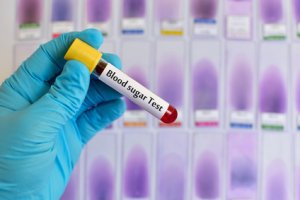- increasing your risk of pancreatitis and other complications
 A new American study shows that chronic alcohol abuse impairs the ability of the pancreas to absorb vitamin C, and that increases the risk of infection of the pancreas (pancreatitis) and other diseases. Lack of certain B vitamins may also damage the pancreas and increase the risk of encephalitis.
A new American study shows that chronic alcohol abuse impairs the ability of the pancreas to absorb vitamin C, and that increases the risk of infection of the pancreas (pancreatitis) and other diseases. Lack of certain B vitamins may also damage the pancreas and increase the risk of encephalitis.
 It is widely established that women of childbearing age have high levels of estrogen that protect them against cardiovascular disease. However, if they have type 1 diabetes, having high estrogen levels actually increases their risk of these diseases. A group of scientists is therefore planning to investigate whether nutritional supplements with antioxidants can protect diabetics against cardiovascular disease and the premature death caused by these ailments.
It is widely established that women of childbearing age have high levels of estrogen that protect them against cardiovascular disease. However, if they have type 1 diabetes, having high estrogen levels actually increases their risk of these diseases. A group of scientists is therefore planning to investigate whether nutritional supplements with antioxidants can protect diabetics against cardiovascular disease and the premature death caused by these ailments.
 Antioxidants such as vitamins C and E are known to be inversely related to type 1 diabetes, which is an autoimmune disease. In a new Swedish study that is published in Nutrients, scientists have found that vitamin E also protects against type 1,5 diabetes, which is similar to type 1 and type 2 diabetes because it involves both autoimmune reactions and insulin resistance. The scientists list different foods that are rich in vitamin E and also describe how vitamin E protects the pancreas against autoimmune attacks and oxidative stress.
Antioxidants such as vitamins C and E are known to be inversely related to type 1 diabetes, which is an autoimmune disease. In a new Swedish study that is published in Nutrients, scientists have found that vitamin E also protects against type 1,5 diabetes, which is similar to type 1 and type 2 diabetes because it involves both autoimmune reactions and insulin resistance. The scientists list different foods that are rich in vitamin E and also describe how vitamin E protects the pancreas against autoimmune attacks and oxidative stress.
 Type 2 diabetes is spreading like a bushfire. An alarmingly many people have metabolic syndrome – or pre-diabetes – which is characterized by insulin resistance, hypertension, elevated cholesterol levels and abdominal obesity (apple-shaped body). Type 2 diabetes and metabolic syndrome are associated with enormous human and socio-economic costs. In this article, we will look closer at chromium, vitamin D, magnesium, and coenzyme Q10 plus relevant diet changes to see how they can positively affect blood sugar levels, cholesterol balance, and weight control. We will also take a closer look at supplements that are able to prevent diabetic neuropathy, a disorder that can lead to amputations.
Type 2 diabetes is spreading like a bushfire. An alarmingly many people have metabolic syndrome – or pre-diabetes – which is characterized by insulin resistance, hypertension, elevated cholesterol levels and abdominal obesity (apple-shaped body). Type 2 diabetes and metabolic syndrome are associated with enormous human and socio-economic costs. In this article, we will look closer at chromium, vitamin D, magnesium, and coenzyme Q10 plus relevant diet changes to see how they can positively affect blood sugar levels, cholesterol balance, and weight control. We will also take a closer look at supplements that are able to prevent diabetic neuropathy, a disorder that can lead to amputations.
 Chromium is primarily known for its role in insulin utilization and blood sugar control. However, chromium is also important for macronutrient metabolism and the circulatory system. Chromium’s role in health has been debated and a group of scientists have looked closer at the link between low blood levels of chromium and global health burdens such as cardiovascular disease, type 2 diabetes, and depression. How do we get enough chromium from the diet and what supplements have the highest bioavailability?
Chromium is primarily known for its role in insulin utilization and blood sugar control. However, chromium is also important for macronutrient metabolism and the circulatory system. Chromium’s role in health has been debated and a group of scientists have looked closer at the link between low blood levels of chromium and global health burdens such as cardiovascular disease, type 2 diabetes, and depression. How do we get enough chromium from the diet and what supplements have the highest bioavailability?
 Type 2 diabetes is spreading like a bushfire and even more people suffer from something called metabolic syndrome, a prediabetic stage characterized by insulin resistance, hypertension, elevated cholesterol, and apple-shaped figure caused by a blood sugar imbalance. Chromium supplementation helps improve insulin sensitivity and lowers weight and blood pressure, thereby reducing the risk of cardiovascular disease, according to a placebo-controlled study that is published in the journal Biological Trace Element Research. It is advisable to lower your carbohydrate intake and to choose a chromium supplement with good bioavailability.
Type 2 diabetes is spreading like a bushfire and even more people suffer from something called metabolic syndrome, a prediabetic stage characterized by insulin resistance, hypertension, elevated cholesterol, and apple-shaped figure caused by a blood sugar imbalance. Chromium supplementation helps improve insulin sensitivity and lowers weight and blood pressure, thereby reducing the risk of cardiovascular disease, according to a placebo-controlled study that is published in the journal Biological Trace Element Research. It is advisable to lower your carbohydrate intake and to choose a chromium supplement with good bioavailability.
 Do you feel an insatiable desire for sweets all the time? Do you find yourself snacking in between meals? A simple think like a daily chromium supplement may resolve your problem and even help you lose weight.
Do you feel an insatiable desire for sweets all the time? Do you find yourself snacking in between meals? A simple think like a daily chromium supplement may resolve your problem and even help you lose weight.
If you are typ e-2 diabetic, you may find that taking a daily supplement of organic chromium yeast can help you cope with your condition.
e-2 diabetic, you may find that taking a daily supplement of organic chromium yeast can help you cope with your condition.
 Yet another scientific study confirms that CLA is effective. A new Spanish double-blind randomized study has shown that 3 g of CLA daily given to a group of healthy, overweight persons, reduced their amount of fat and their weight over a period of 24 weeks.
Yet another scientific study confirms that CLA is effective. A new Spanish double-blind randomized study has shown that 3 g of CLA daily given to a group of healthy, overweight persons, reduced their amount of fat and their weight over a period of 24 weeks.
 Diabetes is spreading like a bushfire across the globe, but even if governments, doctors, and health authorities have tried desperately to bend the curve, they have not succeeded so far. On the contrary. Today, diabetes is controlled with help from different medical drugs that do not address the underlying cause and actually affect or organ systems. Because of this, diabetics often have impaired quality of life and shorter lifespans than healthy individuals. What is more, diabetics have widespread vitamin B12 and vitamin D deficiencies, which are associated with diabetic neuropathy, which is a serious complication. Cholesterol-lowering drugs (statins) are also linked to reduced levels of Q10, a compound that is necessary for energy turnover, the heart, and the cardiovascular system.
Diabetes is spreading like a bushfire across the globe, but even if governments, doctors, and health authorities have tried desperately to bend the curve, they have not succeeded so far. On the contrary. Today, diabetes is controlled with help from different medical drugs that do not address the underlying cause and actually affect or organ systems. Because of this, diabetics often have impaired quality of life and shorter lifespans than healthy individuals. What is more, diabetics have widespread vitamin B12 and vitamin D deficiencies, which are associated with diabetic neuropathy, which is a serious complication. Cholesterol-lowering drugs (statins) are also linked to reduced levels of Q10, a compound that is necessary for energy turnover, the heart, and the cardiovascular system.
 Non-alcoholic fatty liver disease (NAFLD) is a liver disease that is spreading like a bushfire. NAFLD is associated with obesity and metabolic syndrome, which is an early stage of type 2 diabetes. What you eat plays a major role, and a large Chinese study has actually demonstrated that higher dietary intake of vitamin Ccan improve blood sugar levels and the liver function. It is also wise to lower your intake of carbohydrates, especially fructose that can put a huge strain on the liver and turn it into a virtual “fat factory”.
Non-alcoholic fatty liver disease (NAFLD) is a liver disease that is spreading like a bushfire. NAFLD is associated with obesity and metabolic syndrome, which is an early stage of type 2 diabetes. What you eat plays a major role, and a large Chinese study has actually demonstrated that higher dietary intake of vitamin Ccan improve blood sugar levels and the liver function. It is also wise to lower your intake of carbohydrates, especially fructose that can put a huge strain on the liver and turn it into a virtual “fat factory”.
 A new study reveals that children of mothers’ who lacked vitamin B12 during their pregnancy are at increased risk of metabolic diseases like type-2 diabetes. The study also shows that too little vitamin B12 may lead to abnormal levels and malfunctions of the hormone leptin, which signals satiety.
A new study reveals that children of mothers’ who lacked vitamin B12 during their pregnancy are at increased risk of metabolic diseases like type-2 diabetes. The study also shows that too little vitamin B12 may lead to abnormal levels and malfunctions of the hormone leptin, which signals satiety.
- a disabling and potentially life-threatening complication
 Type 2 diabetes is currently treated with a number of different medical drugs. However, the medicine is not able to deal with the underlying causes of the disease that affects most organ systems. A Chinese study has demonstrated that vitamin Ddeficiency is linked to diabetic neuropathy, which is an insidious condition and is associated with inflammation, pain, amputation, circulatory failure, and early death.
Type 2 diabetes is currently treated with a number of different medical drugs. However, the medicine is not able to deal with the underlying causes of the disease that affects most organ systems. A Chinese study has demonstrated that vitamin Ddeficiency is linked to diabetic neuropathy, which is an insidious condition and is associated with inflammation, pain, amputation, circulatory failure, and early death.
It is important to get plenty of vitamin D at all times in order to prevent and treat the early phases of diabetic neuropathy.
– especially among those with metabolic syndrome, an early stage of type-2 diabetes
 Millions of people who are overweight suffer from blood sugar imbalances and metabolic syndrome – often without being aware of it. A study shows that people with metabolic syndrome are severely vitamin E-deficient. This poses a serious threat to their health, as vitamin E is important for the liver, the cardiovascular system, the nervous system, and the body’s ability to protect its cells against oxidative stress and carcinogenic substances. The study, which is published in the American Journal of Clinical Nutrition, reveals that normal measurements of a person’s vitamin E status are misleading.
Millions of people who are overweight suffer from blood sugar imbalances and metabolic syndrome – often without being aware of it. A study shows that people with metabolic syndrome are severely vitamin E-deficient. This poses a serious threat to their health, as vitamin E is important for the liver, the cardiovascular system, the nervous system, and the body’s ability to protect its cells against oxidative stress and carcinogenic substances. The study, which is published in the American Journal of Clinical Nutrition, reveals that normal measurements of a person’s vitamin E status are misleading.
it’s the ultimate and essential “brainwash”
 Groundbreaking research reveals that the human brain is detoxified during our sleep. On the other hand, toxins accumulate in the brain if we suffer from sleep disturbances, increasing our risk of dementia, Alzheimer’s disease, stroke, and numerous other conditions. If you are not helped by the most common guidelines for better sleep, supplementing with the “sleep hormone” melatonin may be an obvious solution that even offers plenty of positive “side effects.”
Groundbreaking research reveals that the human brain is detoxified during our sleep. On the other hand, toxins accumulate in the brain if we suffer from sleep disturbances, increasing our risk of dementia, Alzheimer’s disease, stroke, and numerous other conditions. If you are not helped by the most common guidelines for better sleep, supplementing with the “sleep hormone” melatonin may be an obvious solution that even offers plenty of positive “side effects.”
- which may lead to serious physical and mental diseases
 Recent studies reveal that around 20% of people who take metformin, a drug against type 2 diabetes, are vitamin B12 deficient (or borderline deficient). Lack of vitamin B12 may cause anemia, increased risk of osteoporosis, and symptoms of the nervous system that may be confused with ageing processes. It even looks as if lifestyle changes may have a more positive effect on blood sugar management.
Recent studies reveal that around 20% of people who take metformin, a drug against type 2 diabetes, are vitamin B12 deficient (or borderline deficient). Lack of vitamin B12 may cause anemia, increased risk of osteoporosis, and symptoms of the nervous system that may be confused with ageing processes. It even looks as if lifestyle changes may have a more positive effect on blood sugar management.
 Diabetes is spreading with epidemic proportions, and an alarmingly high number of people are affected by metabolic syndrome, an early stage of diabetes that causes insulin resistance, elevated cholesterol, hypertension, and enlarged waist circumference. Ever since the 1970s, diabetics have been advised to stick with a low-fat diet consisting of bread, potatoes, and other carbohydrate sources. However, a new Danish study reveals that it is best to cut back on your carbohydrate intake. The new message to diabetics supports research from other parts of the world. Diabetics and people with sensitive blood sugar should focus on eating a diet with fewer carbohydrates, more protein, and more healthy fats. They should also make sure to get enough chromium, vitamin D, and magnesium, all of which are nutrients that support the body’s blood sugar levels. Furthermore, vitamin B12 and Q10 are important for those, who take diabetes medication and cholesterol-lowering drugs (statins).
Diabetes is spreading with epidemic proportions, and an alarmingly high number of people are affected by metabolic syndrome, an early stage of diabetes that causes insulin resistance, elevated cholesterol, hypertension, and enlarged waist circumference. Ever since the 1970s, diabetics have been advised to stick with a low-fat diet consisting of bread, potatoes, and other carbohydrate sources. However, a new Danish study reveals that it is best to cut back on your carbohydrate intake. The new message to diabetics supports research from other parts of the world. Diabetics and people with sensitive blood sugar should focus on eating a diet with fewer carbohydrates, more protein, and more healthy fats. They should also make sure to get enough chromium, vitamin D, and magnesium, all of which are nutrients that support the body’s blood sugar levels. Furthermore, vitamin B12 and Q10 are important for those, who take diabetes medication and cholesterol-lowering drugs (statins).
 Chromium is an element and a metal. To humans, it is also an essential micronutrient in the form of so-called trivalent chromium. Chromium also exists as divalent and hexavalent chromium but these forms are toxic. All approved chromium supplements contain trivalent chromium. The various chromium forms can bind with a variety of chemical compounds to form other substances.
Chromium is an element and a metal. To humans, it is also an essential micronutrient in the form of so-called trivalent chromium. Chromium also exists as divalent and hexavalent chromium but these forms are toxic. All approved chromium supplements contain trivalent chromium. The various chromium forms can bind with a variety of chemical compounds to form other substances.
 Diabetes damages the circulatory system in a number of ways that are linked to impaired quality of life and early death. A meta-analysis shows that if type 2 diabetics take supplements of Q10 it lowers their risk of cardiovascular disease by reducing levels of total cholesterol and LDL cholesterol. Another positive effect of Q10 is that it serves as a unique antioxidant that counteracts oxidative stress, which is a major cause of atherosclerosis and cardiovascular damage. One of the problems of using cholesterol-lowering statins is that it inhibits the body’s endogenous Q10 synthesis, but this is something one can compensate for. According to Danish research, it is also a good idea to limit your carbohydrate intake and follow the new dietary guidelines that help stabilize blood sugar levels.
Diabetes damages the circulatory system in a number of ways that are linked to impaired quality of life and early death. A meta-analysis shows that if type 2 diabetics take supplements of Q10 it lowers their risk of cardiovascular disease by reducing levels of total cholesterol and LDL cholesterol. Another positive effect of Q10 is that it serves as a unique antioxidant that counteracts oxidative stress, which is a major cause of atherosclerosis and cardiovascular damage. One of the problems of using cholesterol-lowering statins is that it inhibits the body’s endogenous Q10 synthesis, but this is something one can compensate for. According to Danish research, it is also a good idea to limit your carbohydrate intake and follow the new dietary guidelines that help stabilize blood sugar levels.
 If you want to lose weight and/or maintain your ideal weight, it is important to focus on the right proteins, on Q10, and on brown fat cells, as it all boils down to having an effective metabolism and proper energy utilization.
If you want to lose weight and/or maintain your ideal weight, it is important to focus on the right proteins, on Q10, and on brown fat cells, as it all boils down to having an effective metabolism and proper energy utilization.
If you plan to lose weight in the New Year, forget all about counting calories or working up a sweat in the local gym, unless that is what you want. The first thing you should look at is the distribution of white and brown fat tissue in your body and how you can increase the burning of fat with a few adjustments.
 Researchers have found that sufferers of non-alcoholic fatty liver disease (NAFLD) can protect themselves by taking the vitamin-like substance coenzyme Q10.
Researchers have found that sufferers of non-alcoholic fatty liver disease (NAFLD) can protect themselves by taking the vitamin-like substance coenzyme Q10.
 Type 2 diabetes is spreading like a bushfire, and most people will be affected by periodontal disease at some point in their life. Now, science has discovered that lack of vitamin D, which is also increasingly common, enhances the risk of both diseases. Their observation is based on new study that sheds light, for the very first time, on vitamin D and its role in preventing and treating the two conditions.
Type 2 diabetes is spreading like a bushfire, and most people will be affected by periodontal disease at some point in their life. Now, science has discovered that lack of vitamin D, which is also increasingly common, enhances the risk of both diseases. Their observation is based on new study that sheds light, for the very first time, on vitamin D and its role in preventing and treating the two conditions.
- that can often be remedied with simple diet changes and specific supplements
 The number of Danes suffering from one or several chronic diseases is a lot higher than previously thought, according to a group of scientists behind a new study from Danish Center for Healthcare Improvement at Aalborg University. Diseases such as hypertension, elevated cholesterol, depression, bronchitis, asthma, type 2 diabetes, rheumatism, and osteoporosis are among the most widespread ailments. Although there may be a reason of underlying factors, diet and lack of essential nutrients often play a key role. This is something that we have written about over the years on this website, and we have tried to gather some facts from various articles. Simple diet changes and the use of relevant nutritional supplements may play a key role in the treatment of these chronic ailments that come at a huge price, both to the individual sufferer and to society.
The number of Danes suffering from one or several chronic diseases is a lot higher than previously thought, according to a group of scientists behind a new study from Danish Center for Healthcare Improvement at Aalborg University. Diseases such as hypertension, elevated cholesterol, depression, bronchitis, asthma, type 2 diabetes, rheumatism, and osteoporosis are among the most widespread ailments. Although there may be a reason of underlying factors, diet and lack of essential nutrients often play a key role. This is something that we have written about over the years on this website, and we have tried to gather some facts from various articles. Simple diet changes and the use of relevant nutritional supplements may play a key role in the treatment of these chronic ailments that come at a huge price, both to the individual sufferer and to society.
 More vitamin D may contribute to better blood sugar regulation in type 2 diabetes. Eggs are a good source of vitamin D, but in the winter period it may be a good idea to take a high-dosed supplement.
More vitamin D may contribute to better blood sugar regulation in type 2 diabetes. Eggs are a good source of vitamin D, but in the winter period it may be a good idea to take a high-dosed supplement.
 The rate of prediabetes and diabetes is reaching epidemic proportions. Many people even have prediabetes without being aware of it. The condition is characterized by elevated cholesterol and triglyceride levels, but according to a meta-analysis that is published in Frontiers in Nutrition, high-dosed vitamin D supplementation can lower levels of triglycerides in the blood. The meta-analysis supports earlier studies showing that vitamin D is important for the body’s metabolism of fat and carbohydrates. Around half the world’s population lacks this vitamin, and the need for vitamin D is increased in people with prediabetes and diabetes because they have difficulty with utilizing it.
The rate of prediabetes and diabetes is reaching epidemic proportions. Many people even have prediabetes without being aware of it. The condition is characterized by elevated cholesterol and triglyceride levels, but according to a meta-analysis that is published in Frontiers in Nutrition, high-dosed vitamin D supplementation can lower levels of triglycerides in the blood. The meta-analysis supports earlier studies showing that vitamin D is important for the body’s metabolism of fat and carbohydrates. Around half the world’s population lacks this vitamin, and the need for vitamin D is increased in people with prediabetes and diabetes because they have difficulty with utilizing it.
and can antioxidants prevent it?
 Overweight often leads to type-2 diabetes and the early stage of the condition known as insulin resistance. A new scientific study suggests that oxidative damage, also known as oxidative stress, sets the stage for these disturbances in the body's sugar and lipid metabolism. The doctors behind this study therefore theorize that it is possible to prevent type-2 diabetes with antioxidants that are known to counteract oxidative stress.
Overweight often leads to type-2 diabetes and the early stage of the condition known as insulin resistance. A new scientific study suggests that oxidative damage, also known as oxidative stress, sets the stage for these disturbances in the body's sugar and lipid metabolism. The doctors behind this study therefore theorize that it is possible to prevent type-2 diabetes with antioxidants that are known to counteract oxidative stress.
 There is a link between low blood levels of trace elements like zinc and early stages of diabetes, according to Russian research published in Journal of Trace Elements in Medicine and Biology. A large number of people are believed to have diabetes without knowing it. One of these early stages of diabetes is insulin resistance, a condition where the cellular uptake of sugar is impaired. Another is metabolic syndrome that includes hypertension, elevated cholesterol levels, and a characteristic apple-shaped figure with too much abdominal fat. The question is, how do we get enough zinc, and why do so many people appear to be deficient in this essential trace element?
There is a link between low blood levels of trace elements like zinc and early stages of diabetes, according to Russian research published in Journal of Trace Elements in Medicine and Biology. A large number of people are believed to have diabetes without knowing it. One of these early stages of diabetes is insulin resistance, a condition where the cellular uptake of sugar is impaired. Another is metabolic syndrome that includes hypertension, elevated cholesterol levels, and a characteristic apple-shaped figure with too much abdominal fat. The question is, how do we get enough zinc, and why do so many people appear to be deficient in this essential trace element?
 Type 2 diabetes is spreading like a bushfire with many people unaware that they have the disease. Diabetes increases your risk of cardiovascular disease, blood clots, and early death. A group of scientists from the University of St. Andrews in Scotland has looked closer at the different processes and studied the trace element zinc and its ability to improve the outcome of therapy by preventing dangerous blood clots. The new study is published in the Chemical Science journal. Zincdeficiencies are rather common and type 2 diabetes in itself increases the need for this nutrient.
Type 2 diabetes is spreading like a bushfire with many people unaware that they have the disease. Diabetes increases your risk of cardiovascular disease, blood clots, and early death. A group of scientists from the University of St. Andrews in Scotland has looked closer at the different processes and studied the trace element zinc and its ability to improve the outcome of therapy by preventing dangerous blood clots. The new study is published in the Chemical Science journal. Zincdeficiencies are rather common and type 2 diabetes in itself increases the need for this nutrient.
 A new American study shows that chronic alcohol abuse impairs the ability of the pancreas to absorb vitamin C, and that increases the risk of infection of the pancreas (pancreatitis) and other diseases. Lack of certain B vitamins may also damage the pancreas and increase the risk of encephalitis.
A new American study shows that chronic alcohol abuse impairs the ability of the pancreas to absorb vitamin C, and that increases the risk of infection of the pancreas (pancreatitis) and other diseases. Lack of certain B vitamins may also damage the pancreas and increase the risk of encephalitis.











 It is widely established that women of childbearing age have high levels of estrogen that protect them against cardiovascular disease. However, if they have type 1 diabetes, having high estrogen levels actually increases their risk of these diseases. A group of scientists is therefore planning to investigate whether nutritional supplements with antioxidants can protect diabetics against cardiovascular disease and the premature death caused by these ailments.
It is widely established that women of childbearing age have high levels of estrogen that protect them against cardiovascular disease. However, if they have type 1 diabetes, having high estrogen levels actually increases their risk of these diseases. A group of scientists is therefore planning to investigate whether nutritional supplements with antioxidants can protect diabetics against cardiovascular disease and the premature death caused by these ailments. Antioxidants such as vitamins C and E are known to be inversely related to type 1 diabetes, which is an autoimmune disease. In a new Swedish study that is published in Nutrients, scientists have found that vitamin E also protects against type 1,5 diabetes, which is similar to type 1 and type 2 diabetes because it involves both autoimmune reactions and insulin resistance. The scientists list different foods that are rich in vitamin E and also describe how vitamin E protects the pancreas against autoimmune attacks and oxidative stress.
Antioxidants such as vitamins C and E are known to be inversely related to type 1 diabetes, which is an autoimmune disease. In a new Swedish study that is published in Nutrients, scientists have found that vitamin E also protects against type 1,5 diabetes, which is similar to type 1 and type 2 diabetes because it involves both autoimmune reactions and insulin resistance. The scientists list different foods that are rich in vitamin E and also describe how vitamin E protects the pancreas against autoimmune attacks and oxidative stress. Type 2 diabetes is spreading like a bushfire. An alarmingly many people have metabolic syndrome – or pre-diabetes – which is characterized by insulin resistance, hypertension, elevated cholesterol levels and abdominal obesity (apple-shaped body). Type 2 diabetes and metabolic syndrome are associated with enormous human and socio-economic costs. In this article, we will look closer at chromium, vitamin D, magnesium, and coenzyme Q10 plus relevant diet changes to see how they can positively affect blood sugar levels, cholesterol balance, and weight control. We will also take a closer look at supplements that are able to prevent diabetic neuropathy, a disorder that can lead to amputations.
Type 2 diabetes is spreading like a bushfire. An alarmingly many people have metabolic syndrome – or pre-diabetes – which is characterized by insulin resistance, hypertension, elevated cholesterol levels and abdominal obesity (apple-shaped body). Type 2 diabetes and metabolic syndrome are associated with enormous human and socio-economic costs. In this article, we will look closer at chromium, vitamin D, magnesium, and coenzyme Q10 plus relevant diet changes to see how they can positively affect blood sugar levels, cholesterol balance, and weight control. We will also take a closer look at supplements that are able to prevent diabetic neuropathy, a disorder that can lead to amputations.
 Type 2 diabetes is spreading like a bushfire and even more people suffer from something called metabolic syndrome, a prediabetic stage characterized by insulin resistance, hypertension, elevated cholesterol, and apple-shaped figure caused by a blood sugar imbalance.
Type 2 diabetes is spreading like a bushfire and even more people suffer from something called metabolic syndrome, a prediabetic stage characterized by insulin resistance, hypertension, elevated cholesterol, and apple-shaped figure caused by a blood sugar imbalance.  Do you feel an insatiable desire for sweets all the time? Do you find yourself snacking in between meals? A simple think like a daily chromium supplement may resolve your problem and even help you lose weight.
Do you feel an insatiable desire for sweets all the time? Do you find yourself snacking in between meals? A simple think like a daily chromium supplement may resolve your problem and even help you lose weight. e-2 diabetic, you may find that taking a daily supplement of organic chromium yeast can help you cope with your condition.
e-2 diabetic, you may find that taking a daily supplement of organic chromium yeast can help you cope with your condition. Yet another scientific study confirms that CLA is effective. A new Spanish double-blind randomized study has shown that 3 g of CLA daily given to a group of healthy, overweight persons, reduced their amount of fat and their weight over a period of 24 weeks.
Yet another scientific study confirms that CLA is effective. A new Spanish double-blind randomized study has shown that 3 g of CLA daily given to a group of healthy, overweight persons, reduced their amount of fat and their weight over a period of 24 weeks. Diabetes is spreading like a bushfire across the globe, but even if governments, doctors, and health authorities have tried desperately to bend the curve, they have not succeeded so far. On the contrary. Today, diabetes is controlled with help from different medical drugs that do not address the underlying cause and actually affect or organ systems. Because of this, diabetics often have impaired quality of life and shorter lifespans than healthy individuals. What is more, diabetics have widespread vitamin B12 and vitamin D deficiencies, which are associated with diabetic neuropathy, which is a serious complication. Cholesterol-lowering drugs (statins) are also linked to reduced levels of Q10, a compound that is necessary for energy turnover, the heart, and the cardiovascular system.
Diabetes is spreading like a bushfire across the globe, but even if governments, doctors, and health authorities have tried desperately to bend the curve, they have not succeeded so far. On the contrary. Today, diabetes is controlled with help from different medical drugs that do not address the underlying cause and actually affect or organ systems. Because of this, diabetics often have impaired quality of life and shorter lifespans than healthy individuals. What is more, diabetics have widespread vitamin B12 and vitamin D deficiencies, which are associated with diabetic neuropathy, which is a serious complication. Cholesterol-lowering drugs (statins) are also linked to reduced levels of Q10, a compound that is necessary for energy turnover, the heart, and the cardiovascular system. Non-alcoholic fatty liver disease (NAFLD) is a liver disease that is spreading like a bushfire. NAFLD is associated with obesity and metabolic syndrome, which is an early stage of type 2 diabetes. What you eat plays a major role, and a large Chinese study has actually demonstrated that higher dietary intake of
Non-alcoholic fatty liver disease (NAFLD) is a liver disease that is spreading like a bushfire. NAFLD is associated with obesity and metabolic syndrome, which is an early stage of type 2 diabetes. What you eat plays a major role, and a large Chinese study has actually demonstrated that higher dietary intake of  A new study reveals that children of mothers’ who lacked
A new study reveals that children of mothers’ who lacked Type 2 diabetes is currently treated with a number of different medical drugs. However, the medicine is not able to deal with the underlying causes of the disease that affects most organ systems. A Chinese study has demonstrated that
Type 2 diabetes is currently treated with a number of different medical drugs. However, the medicine is not able to deal with the underlying causes of the disease that affects most organ systems. A Chinese study has demonstrated that  Millions of people who are overweight suffer from blood sugar imbalances and metabolic syndrome – often without being aware of it. A study shows that people with metabolic syndrome are severely vitamin E-deficient. This poses a serious threat to their health, as
Millions of people who are overweight suffer from blood sugar imbalances and metabolic syndrome – often without being aware of it. A study shows that people with metabolic syndrome are severely vitamin E-deficient. This poses a serious threat to their health, as  Groundbreaking research reveals that the human brain is detoxified during our sleep. On the other hand, toxins accumulate in the brain if we suffer from sleep disturbances, increasing our risk of dementia, Alzheimer’s disease, stroke, and numerous other conditions. If you are not helped by the most common guidelines for better sleep, supplementing with the “sleep hormone” melatonin may be an obvious solution that even offers plenty of positive “side effects.”
Groundbreaking research reveals that the human brain is detoxified during our sleep. On the other hand, toxins accumulate in the brain if we suffer from sleep disturbances, increasing our risk of dementia, Alzheimer’s disease, stroke, and numerous other conditions. If you are not helped by the most common guidelines for better sleep, supplementing with the “sleep hormone” melatonin may be an obvious solution that even offers plenty of positive “side effects.” Recent studies reveal that around 20% of people who take metformin, a drug against type 2 diabetes, are
Recent studies reveal that around 20% of people who take metformin, a drug against type 2 diabetes, are  Diabetes is spreading with epidemic proportions, and an alarmingly high number of people are affected by metabolic syndrome, an early stage of diabetes that causes insulin resistance, elevated cholesterol, hypertension, and enlarged waist circumference. Ever since the 1970s, diabetics have been advised to stick with a low-fat diet consisting of bread, potatoes, and other carbohydrate sources. However, a new Danish study reveals that it is best to cut back on your carbohydrate intake. The new message to diabetics supports research from other parts of the world. Diabetics and people with sensitive blood sugar should focus on eating a diet with fewer carbohydrates, more protein, and more healthy fats. They should also make sure to get enough chromium, vitamin D, and magnesium, all of which are nutrients that support the body’s blood sugar levels. Furthermore, vitamin B12 and Q10 are important for those, who take diabetes medication and cholesterol-lowering drugs (statins).
Diabetes is spreading with epidemic proportions, and an alarmingly high number of people are affected by metabolic syndrome, an early stage of diabetes that causes insulin resistance, elevated cholesterol, hypertension, and enlarged waist circumference. Ever since the 1970s, diabetics have been advised to stick with a low-fat diet consisting of bread, potatoes, and other carbohydrate sources. However, a new Danish study reveals that it is best to cut back on your carbohydrate intake. The new message to diabetics supports research from other parts of the world. Diabetics and people with sensitive blood sugar should focus on eating a diet with fewer carbohydrates, more protein, and more healthy fats. They should also make sure to get enough chromium, vitamin D, and magnesium, all of which are nutrients that support the body’s blood sugar levels. Furthermore, vitamin B12 and Q10 are important for those, who take diabetes medication and cholesterol-lowering drugs (statins).
 Diabetes damages the circulatory system in a number of ways that are linked to impaired quality of life and early death. A meta-analysis shows that if type 2 diabetics take supplements of
Diabetes damages the circulatory system in a number of ways that are linked to impaired quality of life and early death. A meta-analysis shows that if type 2 diabetics take supplements of  If you want to lose weight and/or maintain your ideal weight, it is important to focus on the right proteins, on
If you want to lose weight and/or maintain your ideal weight, it is important to focus on the right proteins, on  Researchers have found that sufferers of non-alcoholic fatty liver disease (NAFLD) can protect themselves by taking the vitamin-like substance
Researchers have found that sufferers of non-alcoholic fatty liver disease (NAFLD) can protect themselves by taking the vitamin-like substance  Type 2 diabetes is spreading like a bushfire, and most people will be affected by periodontal disease at some point in their life. Now, science has discovered that lack of
Type 2 diabetes is spreading like a bushfire, and most people will be affected by periodontal disease at some point in their life. Now, science has discovered that lack of  The number of Danes suffering from one or several chronic diseases is a lot higher than previously thought, according to a group of scientists behind a new study from Danish Center for Healthcare Improvement at Aalborg University. Diseases such as hypertension, elevated cholesterol, depression, bronchitis, asthma, type 2 diabetes, rheumatism, and osteoporosis are among the most widespread ailments. Although there may be a reason of underlying factors, diet and lack of essential nutrients often play a key role. This is something that we have written about over the years on this website, and we have tried to gather some facts from various articles. Simple diet changes and the use of relevant nutritional supplements may play a key role in the treatment of these chronic ailments that come at a huge price, both to the individual sufferer and to society.
The number of Danes suffering from one or several chronic diseases is a lot higher than previously thought, according to a group of scientists behind a new study from Danish Center for Healthcare Improvement at Aalborg University. Diseases such as hypertension, elevated cholesterol, depression, bronchitis, asthma, type 2 diabetes, rheumatism, and osteoporosis are among the most widespread ailments. Although there may be a reason of underlying factors, diet and lack of essential nutrients often play a key role. This is something that we have written about over the years on this website, and we have tried to gather some facts from various articles. Simple diet changes and the use of relevant nutritional supplements may play a key role in the treatment of these chronic ailments that come at a huge price, both to the individual sufferer and to society. More vitamin D may contribute to better blood sugar regulation in type 2 diabetes. Eggs are a good source of vitamin D, but in the winter period it may be a good idea to take a high-dosed supplement.
More vitamin D may contribute to better blood sugar regulation in type 2 diabetes. Eggs are a good source of vitamin D, but in the winter period it may be a good idea to take a high-dosed supplement. The rate of prediabetes and diabetes is reaching epidemic proportions. Many people even have prediabetes without being aware of it. The condition is characterized by elevated cholesterol and triglyceride levels, but according to a meta-analysis that is published in Frontiers in Nutrition, high-dosed
The rate of prediabetes and diabetes is reaching epidemic proportions. Many people even have prediabetes without being aware of it. The condition is characterized by elevated cholesterol and triglyceride levels, but according to a meta-analysis that is published in Frontiers in Nutrition, high-dosed  Overweight often leads to type-2 diabetes and the early stage of the condition known as insulin resistance. A new scientific study suggests that oxidative damage, also known as oxidative stress, sets the stage for these disturbances in the body's sugar and lipid metabolism. The doctors behind this study therefore theorize that it is possible to prevent type-2 diabetes with antioxidants that are known to counteract oxidative stress.
Overweight often leads to type-2 diabetes and the early stage of the condition known as insulin resistance. A new scientific study suggests that oxidative damage, also known as oxidative stress, sets the stage for these disturbances in the body's sugar and lipid metabolism. The doctors behind this study therefore theorize that it is possible to prevent type-2 diabetes with antioxidants that are known to counteract oxidative stress.
 Type 2 diabetes is spreading like a bushfire with many people unaware that they have the disease. Diabetes increases your risk of cardiovascular disease, blood clots, and early death. A group of scientists from the University of St. Andrews in Scotland has looked closer at the different processes and studied the trace element zinc and its ability to improve the outcome of therapy by preventing dangerous blood clots. The new study is published in the Chemical Science journal.
Type 2 diabetes is spreading like a bushfire with many people unaware that they have the disease. Diabetes increases your risk of cardiovascular disease, blood clots, and early death. A group of scientists from the University of St. Andrews in Scotland has looked closer at the different processes and studied the trace element zinc and its ability to improve the outcome of therapy by preventing dangerous blood clots. The new study is published in the Chemical Science journal.  "After about one week of taking the Q10 supplement I could feel a huge difference," says 23-year old Alan Piccini, who has been suffering from extreme fatigue and muscle aches ever since he was a child.
"After about one week of taking the Q10 supplement I could feel a huge difference," says 23-year old Alan Piccini, who has been suffering from extreme fatigue and muscle aches ever since he was a child. “Taking capsules with co-enzyme Q10 has freed me of the severe side effects of my cholesterol lowering medicine,” Mrs Franken explains.
“Taking capsules with co-enzyme Q10 has freed me of the severe side effects of my cholesterol lowering medicine,” Mrs Franken explains.